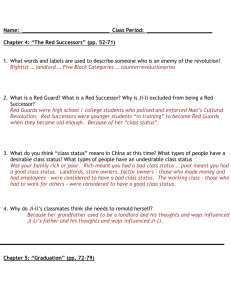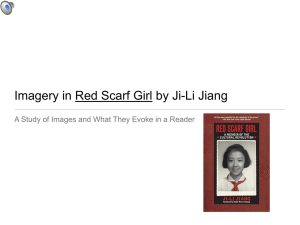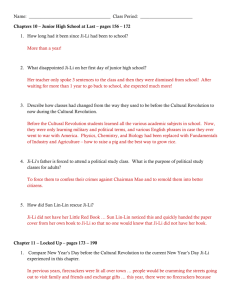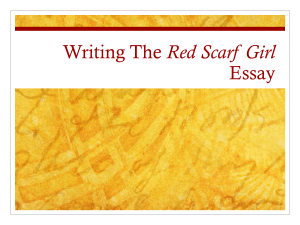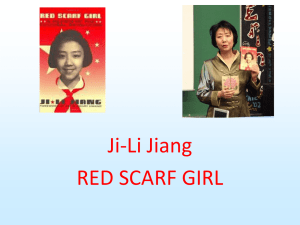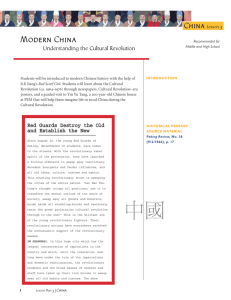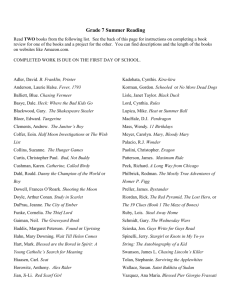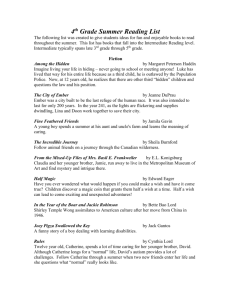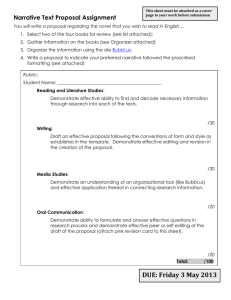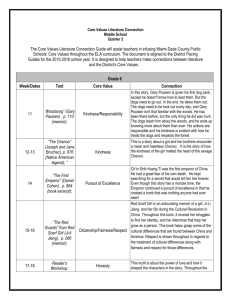Red Scarf Girl Reading Comprehension Questions
advertisement
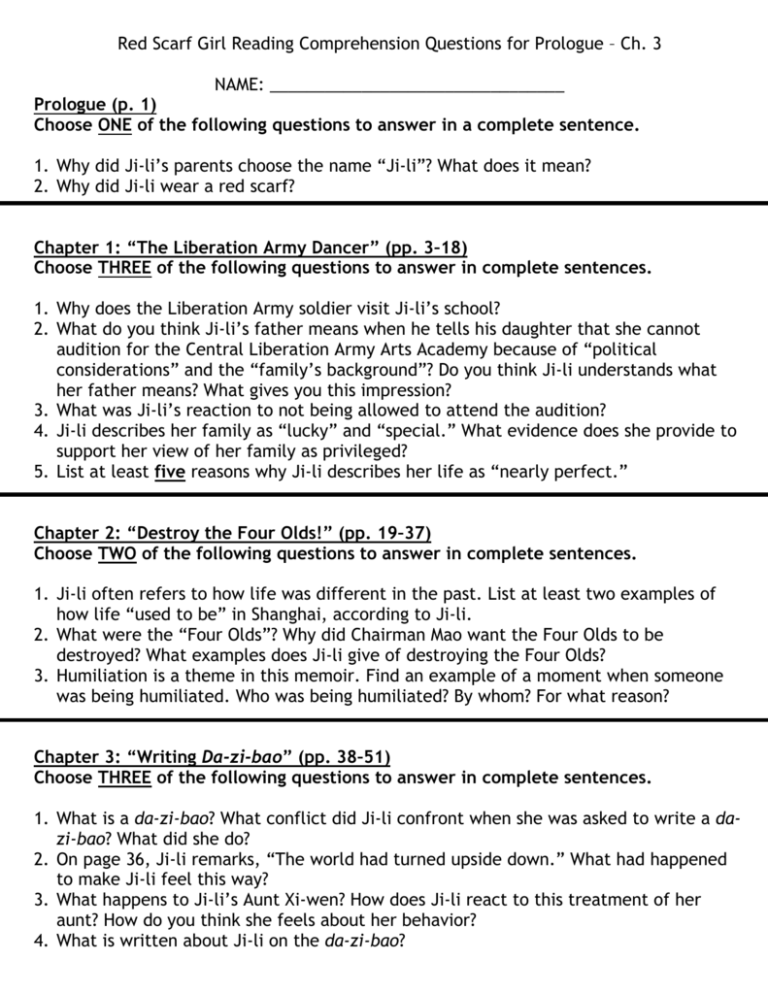
Red Scarf Girl Reading Comprehension Questions for Prologue – Ch. 3 NAME: ________________________________ Prologue (p. 1) Choose ONE of the following questions to answer in a complete sentence. 1. Why did Ji-li’s parents choose the name “Ji-li”? What does it mean? 2. Why did Ji-li wear a red scarf? Chapter 1: “The Liberation Army Dancer” (pp. 3–18) Choose THREE of the following questions to answer in complete sentences. 1. Why does the Liberation Army soldier visit Ji-li’s school? 2. What do you think Ji-li’s father means when he tells his daughter that she cannot audition for the Central Liberation Army Arts Academy because of “political considerations” and the “family’s background”? Do you think Ji-li understands what her father means? What gives you this impression? 3. What was Ji-li’s reaction to not being allowed to attend the audition? 4. Ji-li describes her family as “lucky” and “special.” What evidence does she provide to support her view of her family as privileged? 5. List at least five reasons why Ji-li describes her life as “nearly perfect.” Chapter 2: “Destroy the Four Olds!” (pp. 19–37) Choose TWO of the following questions to answer in complete sentences. 1. Ji-li often refers to how life was different in the past. List at least two examples of how life “used to be” in Shanghai, according to Ji-li. 2. What were the “Four Olds”? Why did Chairman Mao want the Four Olds to be destroyed? What examples does Ji-li give of destroying the Four Olds? 3. Humiliation is a theme in this memoir. Find an example of a moment when someone was being humiliated. Who was being humiliated? By whom? For what reason? Chapter 3: “Writing Da-zi-bao” (pp. 38–51) Choose THREE of the following questions to answer in complete sentences. 1. What is a da-zi-bao? What conflict did Ji-li confront when she was asked to write a dazi-bao? What did she do? 2. On page 36, Ji-li remarks, “The world had turned upside down.” What had happened to make Ji-li feel this way? 3. What happens to Ji-li’s Aunt Xi-wen? How does Ji-li react to this treatment of her aunt? How do you think she feels about her behavior? 4. What is written about Ji-li on the da-zi-bao? Red Scarf Girl Reading Comprehension Questions for Ch. 4 – Ch. 7 Chapter 4: “The Red Successors” (pp. 52–71) Choose TWO of the following questions to answer in complete sentences. 1. What words and labels are used to describe someone who is an enemy of the revolution? 2. What is a Red Guard? What is a Red Successor? Why is Ji-li excluded from being a Red Successor? 3. What do you think “class status” means in China at this time? What types of people have a desirable class status? What types of people have an undesirable class status? 4. Why do Ji-li’s classmates think she needs to remold herself? Chapter 5: “Graduation” (pp. 72–79) Choose TWO of the following questions to answer in complete sentences. 1. How were school assignments made before the Cultural Revolution? How are they being made now? What does Ji-li think of the new school assignment system? 2. Why is Ji-li so excited when she hears where she will be going to junior high school? What changes at the end of the chapter? 3. What does Ji-li think will happen to many of the books in the school library? Chapter 6: “The Sound of Drums and Gongs” (pp. 80–99) Choose TWO of the following questions to answer in complete sentences. 1. What were the Red Guards trying to find when they searched through houses? What does “the sound of drums and gongs” represent? 2. Why do Ji-li’s parents fire Song Po-po? How does Ji-li’s role in her family change as a result? 3. Why does the Jiang family turn silk dresses into mops and paint red leather trunks black? Chapter 7: “The Propaganda Wall” (pp. 100–117) Choose THREE of the following questions to answer in complete sentences. 1. 2. 3. 4. 5. What was the propaganda wall? What are the Five Black Categories? What is the Precious Red Book? What tasks did the Neighborhood Dictatorship Groups perform? Who is Jia Hong-yu, and what does she tell Ji-li and her peers who had gathered in the cafeteria? Red Scarf Girl Reading Comprehension Questions for Ch. 8 – Ch. 11 Chapter 8: “A Search in Passing” (pp. 118–139) Choose THREE of the following questions to answer in complete sentences. 1. Why were Ji-li’s parents burning photographs in their bathroom? 2. On page 126, Ji-li shares, “In the three months since the Cultural Revolution had started, changes had been so constant that I often felt lost.” Identify at least three changes that Ji-li has experienced since the start of the Cultural Revolution. 3. What personal possession of Ji-li’s is taken when the Red Guards search the family’s house? Why is it confiscated? 4. What is the difference between how Ji-yong and Ji-li respond when special items are taken from them? Chapter 9: “Fate” (pp. 140–155) Choose TWO of the following questions to answer in complete sentences. 1. How does Shan-shan act toward his mother? Why do you think he acts this way? 2. What are some ways that Red Guards scared and humiliated people suspected of rightist or anti-revolutionary leanings? 3. What happened to Sang Hong-zhen, Du Hai’s mother? 4. Why does Ji-li hate her grandfather? Chapter 10: “Junior High School at Last” (pp. 156–172) Choose TWO of the following questions to answer in complete sentences. 1. Describe Ji-li’s first day of school. What disappointed her? What part of Ji-li’s first day at junior high school in her new classroom does she enjoy the most? 2. Ji-li’s father is forced to attend a political study class. What was the purpose of political study classes for adults like Ji-li’s father? 3. How does Sun Lin-lin “rescue” Ji-li? 4. How does Ji-li react to being asked to join the propaganda group? Chapter 11: “Locked Up” (pp. 173–190) Choose THREE of the following questions to answer in complete sentences. 1. 2. 3. 4. 5. What was New Year’s Day like before the Cultural Revolution, according to Ji-li? What is it like now? Who is Uncle Fan and why was he crying? Give an example of the Communist Party’s “policy of psychological pressure.” A dilemma is when someone has to make a choice between two or more important values. What dilemmas do Ji-li and members of her family confront in this section? What values are at odds? Red Scarf Girl Reading Comprehension Questions for Ch. 12 – Ch. 15 Chapter 12: “An Educable Child” (pp. 191–205) Choose THREE of the following questions to answer in complete sentences. 1. Why does Ji-li decide to join the group preparing the Class Education Exhibition, despite her family background? 2. What is the Class Education Exhibition? What type of projects do the children work on? 3. Ji-li tells her friend Lin-lin about how Ji-li’s father has been detained. How does Linlin respond? 4. On page 205, Chang Hong tells Ji-li, “But we can’t allow personal matters to interfere with revolutionary duties.” What do you think she means by this? What “personal matter” is she referring to? Chapter 13: “Half-City Jiangs” (pp. 206–217) Choose TWO of the following questions to answer in complete sentences. 1. Describe the policy of confession promoted by the Red Guards and those in charge of the Cultural Revolution. Who is asked to confess? About what crimes are they confessing? What is done to encourage people to confess? 2. What happens to Ji-li’s father after the truth of Uncle Zhu’s confession is revealed? 3. What does the Workers’ Revolt newspaper say about the Jiang family? Is this information true or false? 4. At the beginning of this chapter, why does Ji-li want to change her name? What makes her change her mind? Chapter 14: “The Class Education Exhibition” (pp. 218–229) Choose TWO of the following questions to answer in complete sentences. 1. What story does Ji-li tell as part of the exhibition rehearsal? 2. After Ji-li receives praise for her role in the Class Education Exhibition, why is she replaced by Fang Fang? 3. On page 227, Ji-li says, “I felt like a small animal that had fallen into a trap, alone and helpless, and sure that the hunter was coming.” What do you think Ji-li means when she says this? What is the trap she refers to in this statement? Who is the hunter? 4. What are the two choices Ji-li is given in her teacher’s office by Thin-Face? Chapter 15: “The Rice Harvest” (pp. 230–243) Choose TWO of the following questions to answer in complete sentences. 1. Why is it so important for Ji-li’s political life that she work in the countryside for her summer labor as opposed to a factory? 2. What kind of work does Ji-li perform in the countryside? 3. When Bai Shan offers to help Ji-li, how does she respond? Why do you think she esponds this way? 4. What dream does Ji-li have in this chapter? What do you think it means? Red Scarf Girl Reading Comprehension Questions for Ch. 16– Epilogue Chapter 16: “The Incriminating Letter” (pp. 244–259) Choose TWO of the following questions to answer in complete sentences. 1. What does the letter say that Ji-li finds on her mother’s bed? Why would this letter get the family in trouble? 2. Where does Ji-li hide the letter? 3. What does Thin-Face do to try to get Ji-li to confess about the letter? 4. What are the consequences for Mom and Grandma for being labeled landlords’ wives? Chapter 17: “Sweeping” (pp. 260–264) Choose TWO of the following questions to answer in complete sentences. 1. How has Ji-li’s house changed since the beginning of Red Scarf Girl? 2. What type of work does Ji-li’s grandmother have to do now that she has been classified as a landlord’s wife? 3. Ji-li describes many worries in this chapter. What are a few of the things that she worries about? 4. At the end of this chapter, Ji-li describes how she has changed over the past two years since the start of the Cultural Revolution. What are some of the changes she names? Epilogue (pp. 265–272) Choose FOUR of the following questions to answer in complete sentences. 1. How does Ji-li Jiang explain why so many people went along with the Cultural Revolution? 2. What important lesson does Ji-li take away from her experience growing up during the Cultural Revolution? 3. What happens to Ji-li’s family after the Cultural Revolution? 4. Why does Ji-li decide to move to the United States? 5. According to Ji-li, what happened to people who committed crimes during the Cultural Revolution? 6. In the final line of the epilogue, Ji-li writes, “I hope this book will be part of that mission.” What is the mission she refers to in this quotation? Retrieved from: Highly Unified School District of Arizona web page
